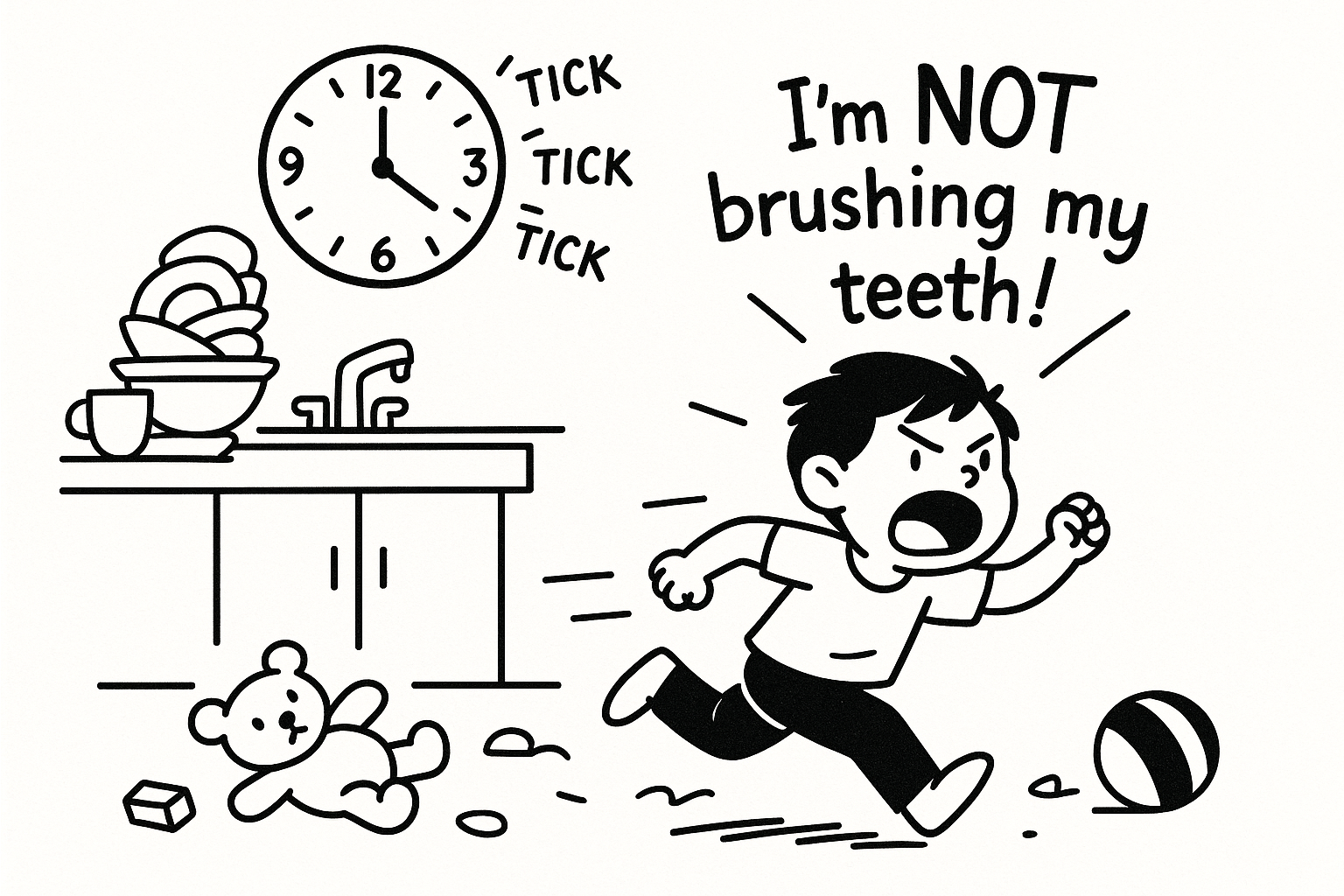
Tick – tick – tick. The kitchen clock beats louder with every second, filling the silence between the hum of the refrigerator and the faint clatter of dishes stacked high in the sink. The overhead light casts a dull glow across the room, catching the mess of toys still scattered on the floor, the unfolded laundry sagging on the couch, and the dinner plates crusting over with food you didn’t have time to scrape off. The house feels heavy with unfinished tasks, every corner whispering reminders of what still needs to be done.
You glance up at the clock. 8:30 p.m. It mocks you, dragging the night out longer than it should be. And just as you notice the time, your child’s footsteps pound down the hallway—thud, thud, thud—followed by a sharp, defiant cry: “I’m not brushing my teeth!”
In that moment, the environment collides with the action: the ticking clock, the clutter, the noise, and your own thinning patience, all building into the chaos that single parents know too well.
The fight is in full swing now. Your child’s voice ricochets off the walls, the clock ticks louder with every second, and your body is begging for relief. You think, “If only someone could take over, just for thirty seconds, I could breathe.”
That’s the first weight of parenting solo: no backup. There’s no one to tag in. No partner to step between you and the chaos. It’s your voice against the storm, your patience stretched thin, your silence the only pause.
Then comes the second weight: role overload. One moment you’re whispering comfort—“I know you’re upset”—and before you’ve even finished the sentence, you’re enforcing rules—“But we still have to clean up these toys.” Comforter and rule-keeper collide in the same breath, and it leaves you wondering who you’re supposed to be.
The guilt follows quickly, sharp as the slam of a bedroom door. The guilt spiral. The sound echoes longer than it should, and you hear it like a verdict: “Did I just damage something between us?” Their tears feel like proof that you’re not enough, that you’ve missed some critical piece of parenting no manual could ever teach.
And then there’s the mirror—the emotional reflection. You see it in their eyes, their voice, their fists. They’re holding up a version of you: the sighs, the tension in your shoulders, the quiver in your tone. Your stress becomes theirs, and they fling it back at you, louder, messier, harder.
This is the weight of parenting solo. Not just the tasks, but the storm inside—the conflict between what you feel and what you want to give.
But here’s the surprising part: sometimes the storm doesn’t need a massive solution. Sometimes it only takes the smallest shift—barely a breath—to change everything.
It starts with the pause. Their words are sharp, your chest is tight, your throat ready to snap. But instead, you draw in one breath. Just one. The noise doesn’t vanish, but something softens—your shoulders drop, your heart steadies. And your child sees it: “Even when things feel scary, we can stay calm together.”
Then, name it to tame it. The pencil snaps, tears drip onto the homework page, and your instinct is to fix it. Instead, you crouch down: “You’re really frustrated that math feels so hard right now.” Their breathing slows. The sobs break into hiccups. You didn’t solve the problem, but you solved the feeling—they felt seen.
Next comes choice power. The hallway echoes with protest: “I don’t want to!” Your voice stays steady: “Do you want pajamas first, or teeth first?” The air shifts, the tension dips. They stomp toward pajamas, not happily, but with control they can claim. And that’s enough.
And finally, the most important: repair. Because there are nights when you do lose it. Your voice too sharp, your words too harsh, the silence afterward thick with regret. But then you circle back. Kneel down. “I didn’t handle that well. I was overwhelmed, but that wasn’t your fault. Let’s try again.” Their small hand slips into yours. The storm clears. What lingers isn’t the mistake—it’s the mending.
These are not tricks or perfect fixes. They’re small choices, made in the middle of the chaos, that slowly stitch connection into the noise.
Later that night, the house finally quiets. The clock ticks on—tick… tick… tick—but now it’s measuring the silence after the storm. You sit on the couch, the laundry still waiting, toys still scattered, your body heavy with exhaustion.
Your child’s door is closed, but you can picture them inside, curled under the blanket, their breathing slow, their cheeks still damp. The echo of their crying clings to your ears, louder than the hum of the fridge.
The guilt creeps in again: “Did I just make things worse? Am I screwing up the most important job I’ll ever have?”
And then—you rise. You walk to their door, ease it open, and whisper: “I didn’t handle that well. I was overwhelmed, but it wasn’t your fault. Let’s try again tomorrow.”
There’s a pause. A rustle of blankets. A small hand reaches out through the dark. You take it. The tension loosens, the air shifts, and for the first time all night, you exhale fully.
This is a connection. Not perfection. Not spotless rooms or flawless parenting. Just the steady practice of pausing, repairing, and choosing to return to each other, over and over again.
Stress will always knock at the door—that’s parenthood. But connection? That’s how you choose to answer.